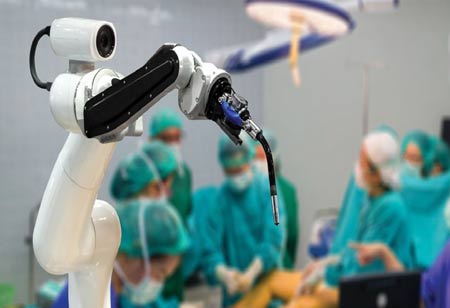Thank you for Subscribing to Healthcare Business Review Weekly Brief

Bridging Innovation, Precision and Care
Healthcare Business Review
Haris’ Professional Journey
I graduated from the University of Nottingham in 2012 with a BMedSci and BMBS degree. After completion of Foundation and Core Medical Training, I commenced Clinical Oncology training in 2016, during which I also completed a one year fellowship in stereotactic radiotherapy. I was appointed as a Consultant Clinical Oncologist at Oxford University Hospitals NHS Foundation Trust in 2022.
Significant Trends and Technology Advancements in the Oncology Space
One of the most significant trends and technology advancements that will impact the oncology space is machine-learning techniques, or artificial intelligence (AI). AI aims to improve efficiency, reduced variability and has the potential to improve precision by providing predictive tools for personalization of treatment.
Radiation Oncology is a highly technical field and there is a great reliance on data processing and computer software. There are various steps within the radiotherapy planning process where AI can be incorporated. One example is with contouring of the target and organs at risk (OARs), which can be a time-consuming process in the era of CT-based planning and IMRT. Automatic contouring of OARs using deformable image registration is currently widely being used in open source applications and commercially. AI is also used in clinical practice at the level of automated treatment planning using knowledge-based planning solution. This leads to time efficiency, while also potentially reducing inter-patient and inter-institution variability. However, it is accepted that this should not be used without supervision
Much remains, however, at research level and there are many potential future applications. One example is the utilization of AI in personalized cancer clinical decision making , by utilizing the ability of AI algorithms to mine unstructured data, leading to personalization of treatment; not to be used in isolation, but supporting the data obtained from randomized controlled trials.
There has also been a great improvement in technology-driven research in radiation oncology, enabling radiotherapy to be delivered in a more precise way. This is important in minimizing long term side effects and survivorship.
Leveraging Experience to Address Challenges in Cancer Treatment
There are a number of challenges facing the cancer treatment space over the next decade. This relates to the increase in cancer diagnoses, contributed by improvement in cancer awareness and diagnostic pathway. Due to better healthcare, the demographic is also changing to an ageing population, which is associated with specific challenges.
The most significant challenge in clinical practice would be in terms of staffing and resources. The NHS is deep in a workforce crisis. This is projected to rise in the next decade and appears to be the trend outside of the UK as well. This can lead to delay in delivery of cancer care, which then affects cancer outcomes.
With any emerging healthcare technologies and approaches, prospective evaluation and real world application, including quality control is important
This would take a coordinated effort and long-term planning by government and training bodies to address. However, as a consultant there are a number of ways that I can leverage my experience to prepare for and address these challenges.
It is important to have an effective retention strategy in an environment where there is already a shortage in a wider labour market. This involves effective listening, expressing appreciation and promoting inclusivity to foster a sense of loyalty to the team and organization. It is also important to recognize effort and talent and creating opportunities where growth could be promoted. The key is to know the people that you are working with, to leverage and hone in on their talent and creating a space where this could be expressed within an organization. If this is integrated within the organizational culture, it would provide long-term benefit to the organization
We can also work with management to ensure that there is an effective proactive strategy to ensure that the service runs smoothly. Staff efficiency can be maximized by creating new opportunities for current employees to step up in more independent and challenging roles within the service where there is a need; this is a conversation with management that can be spearheaded by senior clinicians.
Technologies and Processes in Use
The radiotherapy department in Oxford University Hospitals treats all tumour sites and deliver a wide range of techniques, including IMRT, VMAT, DIBH, IGRT, SABR, SRS, TBI and HDR brachytherapy. Varian Halcyon linacs were acquired recently as part the equipment refresh programme. This uses less energy, providing better experience for patients as it promotes efficiency by delivering treatment more quickly and improvement in overall process flow
The radiotherapy department also works very closely with staff from the University Of Oxford Department Of Oncology and the Oxford Institute for Radiation Oncology to deliver and research cutting-edge radiotherapy treatments.
Emerging Healthcare Technologies and Approaches
With any emerging healthcare technologies and approaches, prospective evaluation and real world application, including quality control is important. It would need to fulfil a specific need and objectives to justify the investment and in the healthcare sector it often relates to improving efficiency.
It is important for new technologies to integrate within the existing system and processes. Healthcare staff working directly with the new technologies would need to be ready for the change and adequately trained. Introducing a new technology often leads to some organisational shift and resistance to change may be one of the potential pitfalls that would need to be addressed and navigated. Integration within the existing system may not be straightforward and would need careful planning and execution to ensure a seamless transition.









